Monty @ 100: "The Big Lift" Or, what Monty did instead of "Sunset Blvd"
 Sunday, October 4, 2020 at 7:00PM
Sunday, October 4, 2020 at 7:00PM We're watching ALL 17 of Montgomery Clift's films for his Centennial. Here's returning contributor David Upton with episode 4.
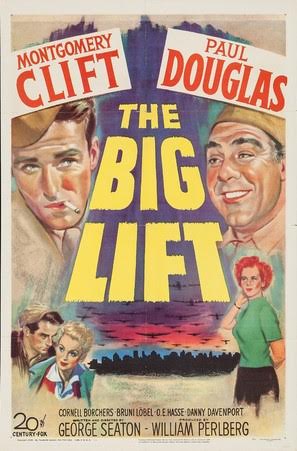
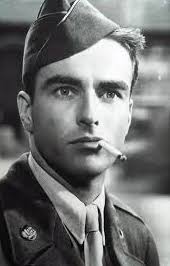
Just two years after his debut in The Search, Montgomery Clift returned to post-war Europe. The Big Lift, released in 1950, was just two years removed from the true story it centres on, the Berlin airlift of 1948. One of the first major crises of the Cold War, the airlift was needed thanks to the Soviet blockade of the part of the city under the control of Western allies. Berlin is a city in ruin, populated by a people torn apart and living amongst rubble. Into this, director George Seaton’s film casts a watchful Monty and the exuberant Paul Douglas as a pair of Air Force sergeants, Danny MacCullough and Hank Kowalski.
Future AMPAS president Seaton, best known for 1947’s whimsical Christmas fantasy Miracle on 34th Street, goes hard on the verité factor, casting all supporting military characters with real Air Force personnel...
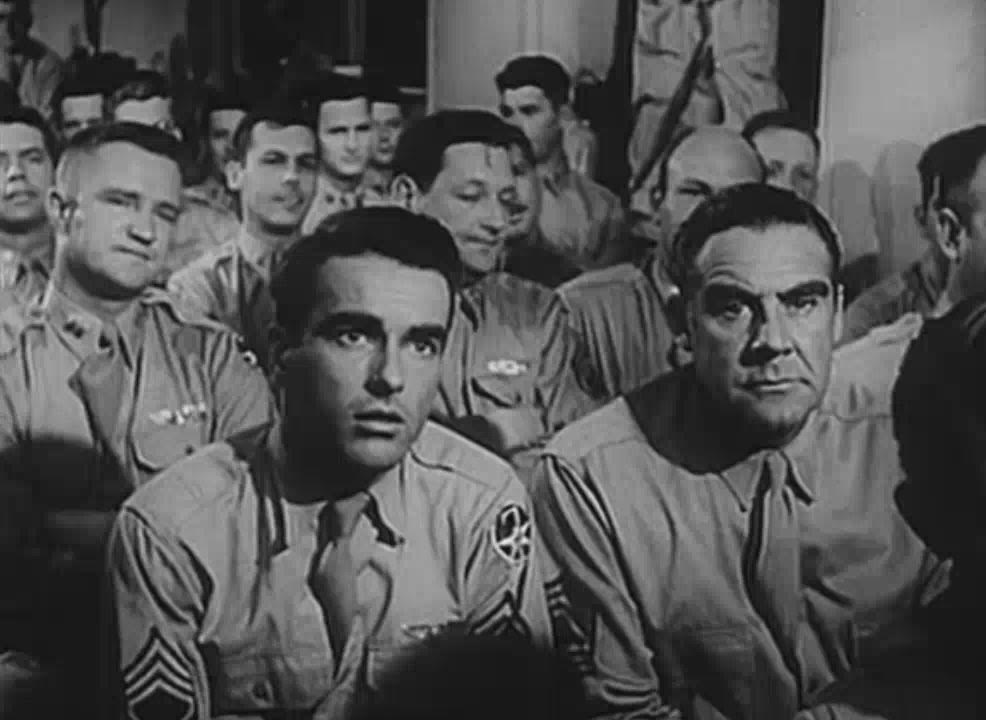
The camera keeps low and close in the cockpit, and starkly captures the crumbling vistas of Berlin as the men make their way around the streets. That veracity doesn’t extend to the narrative, which lands somewhere between a goofy romantic comedy and a moralistic tragedy. It makes for an odd experience, with comic contrivance somewhat undermining the earnest depiction of the physical and emotional impacts of conflict and dictatorship - as critic Bosley Crowther put it at the time, the film conveys a “hodgepodge of impressions”.
Coming early in Clift’s career, The Big Lift is overshadowed by the two beloved films surrounding it; and indeed, in production terms, it's of minor concern. Clift flew out to Berlin after dropping out of Sunset Boulevard (reportedly thanks to similarities with his affair with the much older Libby Holman), and his scenes were prioritised to allow him to return to America to film A Place in the Sun. As a Clift vehicle, The Big Lift isn’t exactly memorable; for much of the film, he actively takes a backseat, and large portions of it are handed instead to Douglas, a boorish mouthpiece for American policy and flagbearer for xenophobia who ‘educates’ his cynical German fling Gerda (Bruni Löbel). Clift’s Red River co-star John Wayne had warned Douglas against the newcomer’s narcissism, and on perceiving Clift hogging his space in one of their first scenes, Douglas stamped on his foot and said, “Do that again and I'll break your fucking foot”. While this animosity isn’t particularly apparent on-screen, the narrative separates them as quickly as it can manage, effectively splitting the film into separate political and emotional threads.
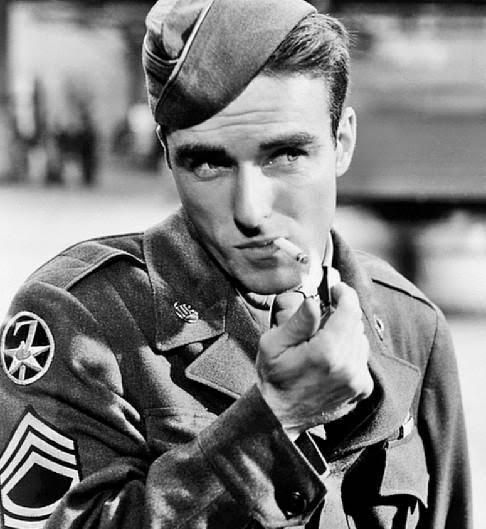
The film’s early sequences, as the troops make their way across the Atlantic and are confined to the Berlin air-base, are the film’s most restrained, and Clift - despite the piercing eyes inevitably drawing the viewer’s attention to him among a crowd - follows suit, allowing the real personnel to have characterful moments and embed himself as ‘one of the guys’, respectful of the men as he shares the screen with them. The dialogue at this point feels spontaneous and earthy, and Clift works particularly well as part of the smaller group in the cockpit, gently reactive to the pilots’ dialogue and conveying the idea of routine and rapport built through a shared history. There’s more of a performative, reactive feel to his more public moments, as if Danny is leaning into the macho posturing and jocular rivalries of the military environment. He chews gum constantly, stands awkwardly in the more formal moments, which works to simultaneously underline his position as a backgrounded engineer and also plays to Clift’s more emotional, unfettered instincts.
Like Douglas, Seaton experienced issues with Clift on-set, ordering his acting coach Mira Rustova off the set, until the actor threatened to quit, and Seaton allowed her to return. In retrospect, it may well be that Rustova’s influence gave the film it’s more powerful and resonant moments thanks to Clift’s more measured playing in the face of tonal incoherence.
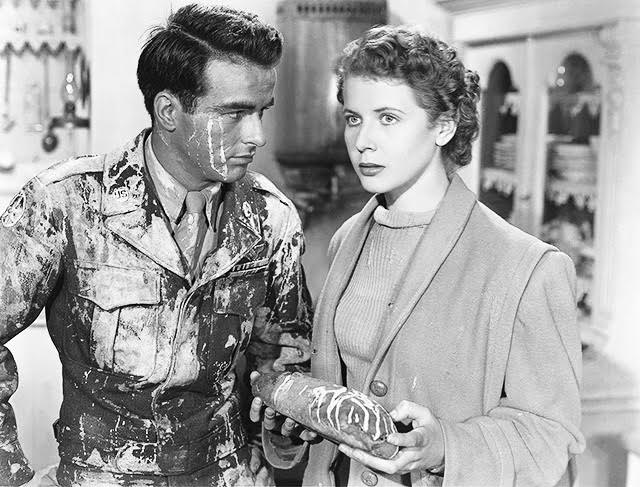
When Danny meets and pursues a Berlin resident, Frederica (Cornell Borchers), the film lets the two sergeants loose in Berlin, with the combined aim of giving the film a fluffy comic injection while exploring the lives of the population in post-war occupied Germany. Clift brings a boyish energy to Danny’s hunger to escape into the city, and manages some absurd comic moments with a light touch, such as joining a group of singers on-stage to avoid Russian interrogation, but the film’s divided loyalties make Danny a rather inconsistent character. Clift overemphasises his naïve shyness towards Frederica and is less adept at capturing the lust Danny is clearly meant to feel. It’s telling that the film marks their implied sexual union by accompanying their clandestine night-time kiss with a plane taking off in the background, a strange piece of daft innuendo.
Ultimately, Seaton can’t balance the variation in tone, bouncing between comedy and drama and losing his grip on the reality of the film’s initial sequences. What’s more unfortunate, perhaps, is the loss of the power of that reality; the script seems to get distracted by the narrative, at the expense of the gritty truth of what these soldiers experienced - something Clift would have undoubtedly excelled at conveying. It replaces this with a sober climax that attempts to underline the twisted nature of growing up under a fascist regime and the lingering damage on their psyche. Clift brings a keen heartbreak to the realisation of the truth he’d previously been blind to, portentous music accompanying his revelation of the poverty and devastation around him, but again, the film undercuts this impact with some goofy comedy surrounding Germany’s poor phone lines. As Crowther put it, Seaton’s film “lacks cohesion, clarity or magnitude” thanks to its conflicted focus, and leaves its audience wanting in every possible respect.
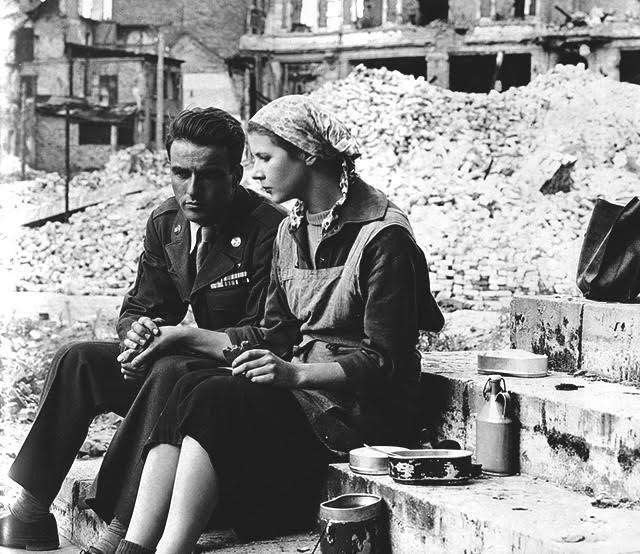
 George Seaton,
George Seaton,  Montgomery Clift,
Montgomery Clift,  WW II
WW II 


Reader Comments (8)
I didn't hate this by any means but it was very average. I did note that severe unevenness in tone. I'm a fan of both Monty and Paul Douglas but both have far better films in their respective filmographies and they are an even stranger match up than Clift and John Wayne.
One positive thing that can be said about this film is that the poster is beautiful. ^ _ ^
Hmmm, there were a few things I liked about this film, but nonetheless pretty forgettable. After yesterday’s amazing “The Heiress” performance, I’m hoping the next Clift film I see makes up for this!
@ George P.
If it's A Place in the Sun, you're in luck. It's my all-time favorite movie, in any case, due to a great extent (but not entirely) to Clift's performance.
I really enjoyed re-watching The Big Lift for the most part. The G.I./airlift stuff is excellent for the reasons David Upton mentions, as is the location footage of bombed-out Berlin. But the moralizing tragedy it turns into—no thanks.
I tend to be fascinated by these postwar rubble films and the chilling sense of epic ruin their locations convey. "The Big Lift" isn'tt up to the level of "Germany Year Zero" or the lesser known "Zwischen gestern und morgen" with Hildegard Knef.. But - for the most part - I find it pretty absorbing. Performance-wise, though Cornell Borchers is the MVP. for me. Wonderful, nuanced work that makes her the film's most convincing and complex character. Definitely on my list of Best Actress nominees in 1950, alongside Swanson, Davis and Eleanor Parker ("Caged") - with
Ingrid Bergman ("Stromboli"), Margaret Sullavan ("No Sad Songs for Me") and Patricia Neal ("Three Secrets") fighting it out for spot number five.
I thought the film was minor, but I agree that Cornell Borchers was superb. Check her out in "Never Say Goodbye", "Istanbul" and "Flood Tide." She sounds like and resembles Ingrid Bergman; also tall but German, fairer, with turquoise eyes and superb acting. Looking forward to the next Monty film tribute.
I've always found Cornell Borchers his dullest leading lady. And seriously, that Barbershop Quartet scene deserves a mention. It's charming, and shows Clift could be funny. It was not all doom and brooding.
Not expecting a response 3 years later, but was impelled to leave a comment here.
Let's line up Clift's first 4 movies:
RED RIVER
THE SEARCH
THE HEIRESS
THE BIG LIFT
One of these is so not like the others, it's tragic. Given the quality of work he was doing and the esteemed directors he was collaborating with, the fact that he snubbed Wilder for the last dripping slice of mediocrity makes me choke on bile. SUNSET BLVD. fits so beautifully into Clift's filmography at that point in time, it's preposterous we live in a world where it didn't actually happen.
Apparently the documentary from a years back, MAKING MONTGOMERY CLIFT, doubles down on his decision and alleges that it wasn't because of Holman he decided to walk away, but a genuine disbelief that he'd be good in the role...sounds like a bunch of myth-making to me. If that were the case, he wouldn't have agreed to do it and signed on in the first place.
In Patricia Bosworth's celebrated biography, she talks about how enthusiastic Clift was about the part, and that he and Wilder were already bouncing ideas off one another.
Keep everything else about Clift's career the same, with the exception of SUNSET BLVD. in place of THE BIG LIFT...things look A LOT different. Not only can he now claim an indisputable top-10 American movie, but the narrative for him winning an Oscar by '53 would have had too much momentum to be derailed.
Just an absolute shame for movie and Clift fans. I think Joe Gillis would have been a dead heat with George Eastman for Clift's signature role.